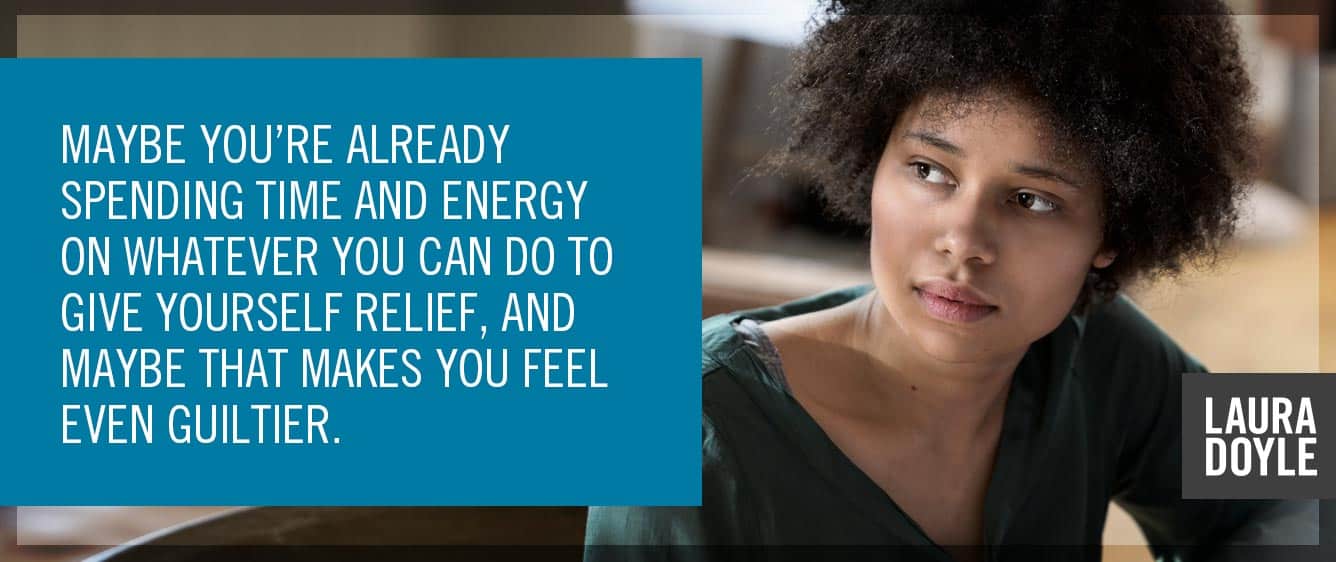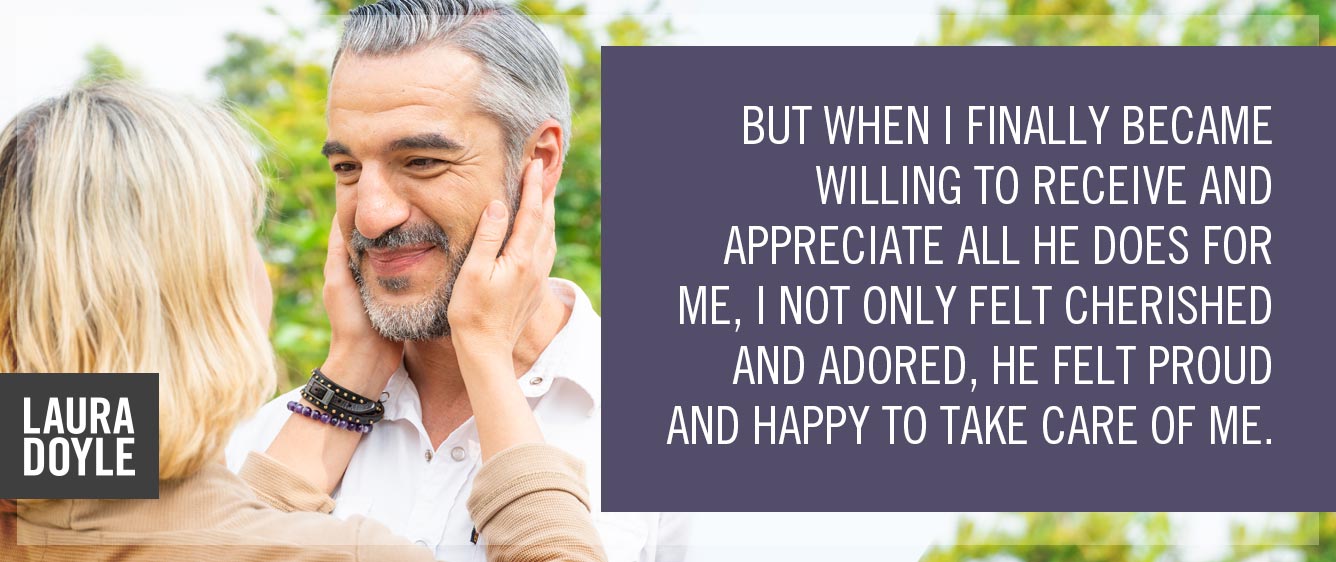How Does Chronic Pain Affect Your Marriage?

As you already know if you or your husband has chronic pain, it can put a massive strain on a marriage. When one of you is always hurting, it’s an ever present challenge to emotional and physical intimacy. Just like when you’re sick, it’s very hard to be at your best when you’re going “ouch,” “ouch,” “ouch” all day.
It can also interfere with giving and receiving physical affection, which is frustrating and lonely on top of everything else.
If you’re not sure how the physical pain will ever be alleviated, that’s so discouraging and leaves you feeling guilty that you can’t be the kind of wife you want to be and hopeless that you’ll ever have a happy marriage. So much seems out of your control that it’s hard to know what you can ever do to improve the situation, especially if your marriage feels like it’s unraveling already.
So how can you even begin to fix your marriage when that’s happening? Here are three ways:
Contents
1. Give Yourself Remedial Self-Care

If you’ve been in pain for a while, you may already be laying low or having to rest more than you’d like, which can make you feel guilty. You may have a whole list of should’s that you’d be doing if you weren’t hurting.
What if you instead went straight into putting the time, energy and resources you do have toward things that bring you relief, guilt be damned?
When I’m sick or hurting in some way, I consider it a sign that I need remedial self-care: a break from my responsibilities, lots of rest, great nutrition, the care of a professional and a marathon of mindless home remodeling shows.
Maybe you’re already spending time and energy on whatever you can do to give yourself relief, and maybe that makes you feel even guiltier.
Granted, you probably don’t want to spend your whole life on the couch watching TV, but being responsive to my physical state is certainly a way to show myself love. If I’m not showing myself love, that’s a pain all its own. I’m not going to be in much of a position to receive it from anyone else, including my husband.
So sometimes remedial self-care feels like exactly what the doctor ordered .
2. Focus on What Feels Good

Chronic pain has a way of grabbing your attention. It’s always there, saying “You can’t forget about me!” So the idea of focusing on what’s feeling good may sound bonkers. It’s the equivalent of hitting your thumb with a hammer and, instead of swearing, saying to yourself, “Boy these nine other fingers feel so good!”
Who does that, right? It’s completely counterintuitive, if not downright crazy.
As a mere mortal woman, I do my share of cursing when hammer meets thumb. But I’m also a huge believer in the power of counting my blessings instead of my curses.
I’ve done both! I’ve given a lot of focus to my problems and I’ve also tried listing all the things I’m grateful for, and I’d much rather live at the end of the gratitude list than at the end of my problems list.
These days I’m really picky about what I focus on because what I focus on increases.
So my question for you, something I ask myself again and again, is: What’s feeling really good right now?
And how can you give yourself more of that?
It takes something to change my focus like that, especially if I’m used to focusing on what’s wrong, which sometimes feels like the default. But it’s well within my power, although not always my comfort zone, to change the channel and have a completely different experience, a better experience. I think of that expression, “Pain is inevitable. Suffering is optional.”
When I’m steeped in all the things I’m grateful for, my energy becomes more attractive to everyone around me, especially my husband.
Doesn’t that make you want to do a quick gratitude list right now? Maybe just five things that feel good? Me too.
3. Receive, Receive, Receive

If you’re feeling less self-sufficient and more dependent or even like a burden on your husband because of chronic pain, that can be its own source of guilt or shame. Nobody wants to feel like a burden.
But what if instead of berating yourself for not being able to do all you wish you could, you relaxed into being a great receiver?
What do I mean by that?
If your husband is doing extra heavy lifting because of your chronic pain, then that means he is contributing to your life, your family, and your health in a way that feels purposeful and important to him. Without your receptivity, he would not have that purpose.
I think of the coffee cup analogy I learned years ago from a comparative religions student who told me that every object has the properties of yin and yang. Like the ceramic part that forms a coffee cup, where that structure is the yang, or the masculine. The yin, or the feminine, is the part that can hold the coffee.
And without the part that receives the coffee, the cup would have no purpose.
If your husband seems resentful about your chronic pain or the responsibilities he takes on as a result of your limitations, it could be that he doesn’t feel appreciated. That has happened around here too, when I was too afraid to acknowledge and thank my husband because I thought I’d be calling even more attention to my inadequacies.
But when I finally became willing to receive and appreciate all he does for me, I not only felt cherished and adored, he felt proud and happy to take care of me.
When Valerie experimented with this and the other Intimacy Skills, she didn’t just revive a marriage that had seemed destined to self-destruct because of her chronic pain and the stress of caring for her special needs daughter. She also found herself feeling better from all the smiling and sweet interactions with her husband, who went from stony cold co-parent to her tender, attentive hero when she brought her receptivity and gratitude instead of defensiveness and guilt.
And while seeing how much he wanted to give her and do for her didn’t cure her painful condition, it did make her feel better and lighter. Although she still had challenging days, one problem she no longer had was a stressful marriage.
So it’s interesting to think about what might happen if you were to give up any guilty, defensive posture you might have taken on around chronic pain and become a gracious receiver, with lots of appreciation for your man.


3 replies on “How Does Chronic Pain Affect Your Marriage?”
Massages are helping me to soothe the pain, but my massage therapist is a little bit too attractive, if you know what I mean.
Thank you Laura, my husband has chronic pain, and it hasn’t gone away. But learning the skills have definitely helped our marriage go from a strained one to a much more connected and passionate one. I’m just 3 months, and we have been together for 15 years it was never this great! We are still a work in progress but your skills came at the right time.
Justine, that is amazing! Congratulations on making your marriage better than ever after just a few months! Thank you for sharing your inspiration.